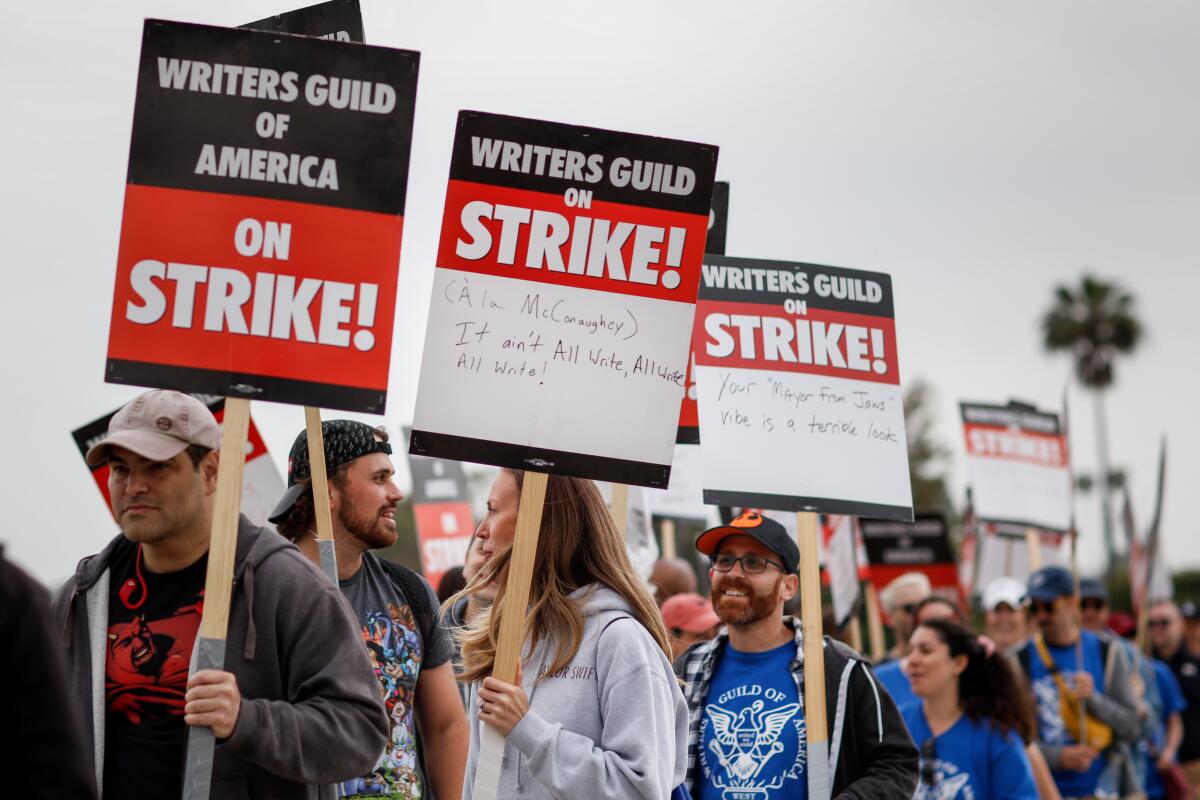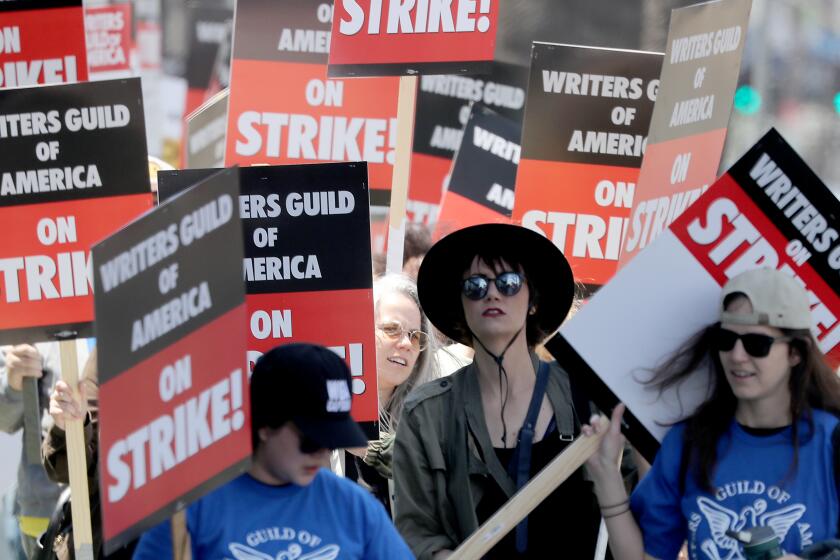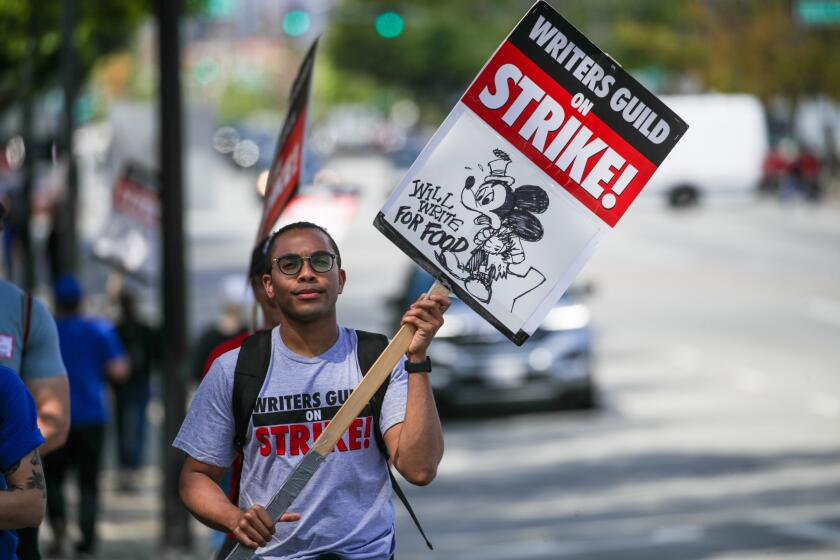WGA and studios make progress in bargaining session, but no deal yet

- Share via
The Writers Guild of America and major studio representatives met Friday for the third consecutive day, as throngs of film and television screenwriters hit picket lines in a show of solidarity and hope that the sides would reach a deal to end the epic strike that has thrown tens of thousands of people out of work.
Around 8:30 p.m., entertainment company chiefs, studio negotiators and WGA negotiating committee members wrapped up another long bargaining day, but there was still no agreement on a new contract, people close to the negotiations told The Times.
Progress was made to close the gaps remaining between the WGA and the Alliance of Motion Picture and Television Producers, which represents the major Hollywood studios in labor negotiations.
WGA said it would meet with the AMPTP again Saturday.
“Thank you for the wonderful show of support on the picket lines today!” WGA’s negotiating committee wrote in a note to members Friday night. “It means so much to us as we continue to work toward a deal that writers deserve.”
AMPTP had no comment Friday.
The two sides have been negotiating for a new contract that would end the writers’ strike, which has stretched for more than 140 days, crippling much of the entertainment economy by shutting down scripted TV and movie production.
The 2023 writers’ strike is over after the Writers Guild of America and the Alliance of Motion Picture and Television Producers reached a deal.
While the recent string of lengthy talks has shown progress, the writers and the studios had yet to reach compromises on at least one or two key issues by the end of Friday’s gathering. Throughout the day, the conversations centered on minimum staffing in writers rooms and streaming data disclosures for the purposes of establishing a payment system based on viewership. Friday’s meeting began about 11 a.m.
The duration of the strikes and the drama surrounding the negotiations have been a roller coaster for workers, including writers, actors, directors and below-the-line crew, who are waiting for a deal to come together so they can return to their trades.
The sides began negotiating Wednesday for the first time since late August. In a sign of the studios’ eagerness to end the work stoppage, top executives from four entertainment giants joined the meetings: Walt Disney Co.’s Bob Iger, Warner Bros. Discovery’s David Zaslav, Netflix’s Ted Sarandos and NBCUniversal’s Donna Langley.
Negotiations have taken place during all-day sessions, leading to renewed optimism that a deal could be reached as soon as this week despite the thorniness of the remaining issues, though sources cautioned it remained unlikely that an agreement would be hammered out before the weekend. Monday is the Jewish holiday Yom Kippur.
Like most WGA members, many Black writers widely support the strike but fear there will be a contraction of projects and opportunities once Hollywood gets back to work.
Los Angeles Mayor Karen Bass said in a statement Thursday she was “very encouraged” that the principals came to the table this week.
“The entertainment industry is a fundamental pillar of our economy, directly impacting not just those who work in the industry but the thousands of small businesses that support the industry every day,” Bass said. “I will continue to be in touch with all parties involved. Let’s get this deal done.”
The WGA’s negotiating committee sent a note to members Thursday night calling on writers to show up in force on picket lines in front of the studios.
Writers throughout Los Angeles obliged, marching and protesting near Walt Disney Co.’s Burbank headquarters, Paramount Pictures’ Hollywood lot, Universal Pictures in Universal City and the Fox studio in Century City. Photos of writers holding signs flooded social media.
“Seeing pics of the lines today is EVERYTHING. #wgastrong,” wrote Ellen Stutzman, the WGA’s chief negotiator, on X, the social media platform formerly known as Twitter.
Sources said both sides are continuing to work to get to an agreement but need to reach a consensus on major issues related to how streaming has upended the traditional television business.
Viewership data from streaming services such as Netflix and Disney+ has become a major sticking point in the writers’ and actors’ strikes.
Shorter seasons for streaming shows and smaller writers rooms have cut into guild members’ pay and stability, making it harder to earn a sustainable living in the expensive media hubs of Los Angeles and New York, guild members have said.
To address this, the WGA sought a minimum of six writers per room in its original proposal. The AMPTP, in an Aug. 11 proposal, offered to let showrunners on high-budget streaming and TV series hire at least two writers for at least 20 weeks of employment. It further proposed guaranteeing writers a minimum of 10 weeks of employment in development rooms.
Writers also are seeking additional payment based on viewership data. The AMPTP, in its Aug. 11 offer, proposed that the WGA could study confidential quarterly reports that show total minutes viewed of high-budget films and series and the programs’ total running time.
But in an Aug. 24 memo, the WGA’s negotiating committee said AMPTP offered to show that data only to six guild staffers and said they could not share that data with other writers. “The counteroffer is neither nothing, nor nearly enough,” the negotiating committee said in its memo at the time.
Hollywood film and TV actors organized under SAG-AFTRA also went on strike in mid-July, further energizing the writers at a critical moment in what has become known as “hot labor summer.” SAG-AFTRA and the AMPTP have not held formal talks since the actors’ strike began.
Times staff writer Julia Wick contributed to this report.
More to Read
Inside the business of entertainment
The Wide Shot brings you news, analysis and insights on everything from streaming wars to production — and what it all means for the future.
You may occasionally receive promotional content from the Los Angeles Times.















